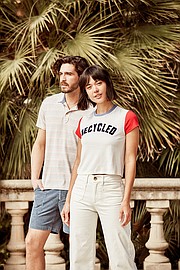RECYCLED T-SHIRTS
Marine Layer Uses Old T-shirts for New Collection
To combat the scourge of apparel-manufacturing waste, San Francisco brand Marine Layer is working with consumers to produce a new collection of shirts produced completely from recycled T-shirts.
Marine Layer’s founder and chief executive officer, Michael Natenshon, said this is the first line of T-shirts, tank tops, polos and raglans that is produced using 100 percent recycled tees from post-consumer sources.
“There are a lot of people trying to solve the sustainability issues in the fashion world and they’re doing a lot of interesting things,” Natenshon said. “What is unique about this program is we’re keeping the shirts from landfills and working on what I think is the biggest problem in the fashion industry, which is apparel waste due to fast fashion.”
The company started out in 2010 with T-shirts made from a blend of Pima cotton and Modal. Now, Natenshon sources old T-shirts from consumers, who receive a $5 credit for each piece donated—up to $25—resulting in a blend that typically comprises cotton and polyester. Customers can send unwanted T-shirts to the company via a kit that Marine Layer provides or simply drop off the garments at one of the brand’s 41 retail locations within the United States.
“The RealReal and ThredUp are doing cool things with reselling goods, but there is only a percentage of your closet that is actually resellable. People wear through clothes. It will get holes, and Goodwill will just throw it away,” Natenshon said. “This is the solution for clothes that are beyond repair.”
The only guideline is that the shirts being used for this new material contain at least 40 percent cotton. Stained, worn, torn and embellished pieces are usable. However, any embellishments must be removed by the workers who produce the Re-Spun line.
Donated pieces that are not usable for re-spinning are repurposed into insulation. In addition to recycling T-shirts, the cleaning and sanitizing process for the garments is waterless and free of toxic chemicals.
“The whole process is waterless—it’s pretty cool. The fibers are cleaned using an ultraviolet technology as opposed to a chemical or water-based cleaner,” Natenshon explained. “We don’t dye the shirts. We sort all the blues, sort all the reds, sort all the light colors. Then we break them down at the color level so all the fibers are re-spun together and don’t need to be dyed again.”
Following the sanitizing process, the reclaimed shirts are transformed into new textiles by a mill in Spain, and new shirts are manufactured in Los Angeles. This process provides an apparel-waste solution by extending the life of the original garments, which otherwise could end up in a landfill.
“It’s a unique program. The only trick is that you need a lot of shirts for it to work. That is the reason it’s so cool to have our customers be so supportive. As long as the shirts keep coming, we’ll keep taking them,” Natenshon said.
Natenshon is extremely grateful for the community’s support, which includes a large number of donations provided by consumers who aren’t even customers of the brand as well as donated products from other labels.
To begin working on the Re-Spun line, Marine Layer had to collect 10,000 shirts to start the program. It collected 5,000 the first day and more than 25,000 the first month. To date, the program has collected 75,000 in nearly five months.
“Producing Re-Spun wouldn’t be possible without the knitting and technology that we developed but also the participation from our customers,” Natenshon said.
The program will launch on April 28, but Marine Layer is not stopping with this first step. By fall, the company would like to offer Re-Spun fleece, growing the line from its initial eight SKUs to an additional 25. Within two years, the brand hopes to produce 50 percent of its goods through the Re-Spun initiative.
Despite Marine Layer’s commitment to selling its goods exclusively through its own branded online and bricks-and-mortar stores, Natenshon said the company is considering collaborating with retailers to promote the Re-Spun initiative.
“We want to work with our manufacturing partners and are open to retail partners. This program is going to be more successful the more people who participate in it,” he said. “We are in talks to offer the Re-Spun line to wholesale retail partners. This is an important message that we want out in the marketplace.”
The Re-Spun collection is available for women in sizes XS–XL and men’s S–XL, with the company’s exclusive in-between sizing of Marge—a medium/large—and Larger. Starting April 28, the line will be available through Marine Layer’s retail locations, online at www.marinelayer.com and on the road with the brand’s first mobile store, which will travel throughout the United States for six months. Retail prices range from $52 to $92.
























